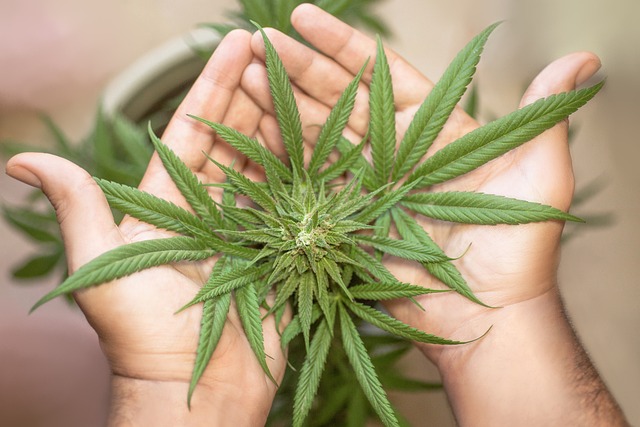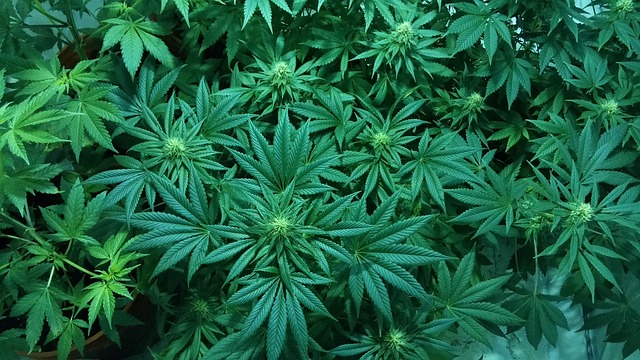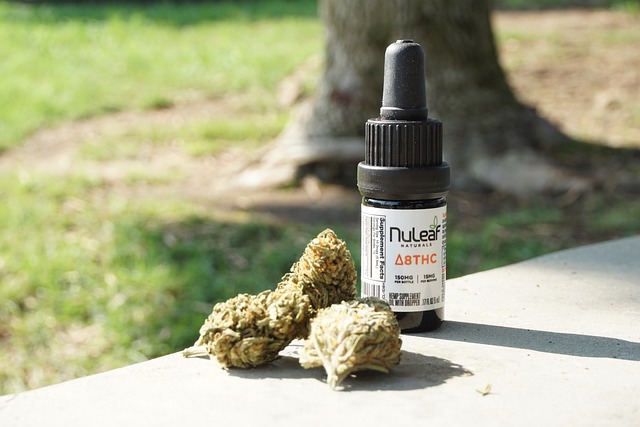THCA (tetrahydrocannabinolic acid), a non-psychoactive compound found in cannabis, has been legally recognized in Massachusetts as a wellness alternative within both the medical and adult-use cannabis programs. The state's regulations permit the cultivation, possession, and sale of THCA through licensed dispensaries, allowing residents to explore its potential health benefits, which include anti-inflammatory and neuroprotective effects, without altering their mental state. Massachusetts' progressive approach to cannabis legislation has established clear guidelines for users to follow, ensuring legal access to THCA flower and its natural terpenes and cannabinoids for maximum potency and efficacy in pain relief and inducing calm. The legality of THCA-rich hemp products in the state aligns with federal regulations under the 2018 Farm Bill, emphasizing the need for consumers to be aware of both state and local laws that may vary by municipality. Users are encouraged to stay informed on legislative changes and adhere to the state's regulatory framework when incorporating THCA into their wellness regimen.
Exploring the potential wellness benefits of THCA flower, an emerging non-psychoactive cannabinoid, this article provides a comprehensive guide to understanding its legality, therapeutic properties, and practical use. Delving into the science behind THCA’s health advantages, we compare its effects with those of Delta-9 THC and other cannabinoids, offering insights into how it fits within the broader cannabis spectrum. With Massachusetts at the forefront of THCA legal acceptance, this piece navigates the evolving regulations surrounding its use. Join us as we examine cultivation standards, safe consumption practices, and real user experiences, all while considering the future landscape of THCA research and its implications for health and wellness.
- Unveiling THCA Flower: The Natural Wellness Choice
- Understanding THCA: The Precursor to THC and Its Potential Benefits
- THCA Legal Status in Massachusetts: Navigating the Laws
Unveiling THCA Flower: The Natural Wellness Choice

Unveiling THCA Flower as a natural wellness choice presents an opportunity to explore the potential benefits of this cannabinoid-rich compound. Tetrahydrocannabinolic acid (THCA) is the raw, non-psychoactive precursor to the well-known THC found in hemp and cannabis plants. As such, it offers a broad spectrum of wellness properties without the psychotropic effects typically associated with its derivative. In Massachusetts, where THCA-rich hemp products are legal, enthusiasts and health-conscious individuals can partake in the potential benefits without legal concern. The flower form of THCA allows for the preservation of its natural state, ensuring that users experience the full range of its terpenes and cannabinoids in their most intact and potent forms. This direct interaction with the plant’s compounds is believed to support various aspects of well-being, from pain relief to promoting a calming effect, all while adhering to Massachusetts’ regulatory framework for hemp products. Users interested in incorporating THCA flower into their wellness routine can do so confidently, knowing that they are engaging with a legal and natural option within the thriving Massachusetts market.
Understanding THCA: The Precursor to THC and Its Potential Benefits

THCA, or tetrahydrocannabinolic acid, is a natural compound found in the cannabis plant that serves as the precursor to the more well-known psychoactive substance THC (tetrahydrocannabinol). As research continues to evolve, scientists are uncovering the potential therapeutic benefits of THCA, which have sparked significant interest among both researchers and consumers. While THC is known for its psychoactive properties, THCA is non-psychoactive, offering a range of potential health advantages without the intoxicating effects. In Massachusetts, where the legal landscape has embraced cannabis products, including those containing THCA, individuals are exploring these benefits within a regulated framework. Preliminary studies suggest that THCA may possess anti-inflammatory, neuroprotective, and anti-nausea properties, making it a subject of interest for various applications in health and wellness. The legal status of THCA in Massachusetts allows for the investigation of its potential benefits in a controlled setting, contributing to the broader understanding of cannabinoids and their effects on human health. Consumers and patients are increasingly turning to THCA-rich products, hoping to harness its therapeutic potential while adhering to state regulations. As with any substance, it is crucial for users to stay informed about the latest research and comply with local laws regarding cannabis product use.
THCA Legal Status in Massachusetts: Navigating the Laws

In Massachusetts, the legal status of THCA, or tetrahydrocannabinolic acid, a non-psychoactive cannabinoid found in raw cannabis that can convert into THC when heated, is subject to evolving state regulations. As of the knowledge cutoff date, THCA is legally permissible under the state’s medical and adult-use cannabis programs. The Massachusetts Department of Public Health has established guidelines for the cultivation, possession, and sale of cannabis products, including those containing THCA. Patients registered in the state’s Medical Use of Marijuana Program (MUMP) can legally access THCA-rich products for therapeutic purposes. Similarly, adults over 21 years old can purchase and possess THCA-infused items from licensed recreational cannabis dispensaries. It’s crucial for consumers to stay informed about the specific laws governing THCA in Massachusetts, as these may change with legislative updates or as the state refines its approach to cannabis regulation.
Navigating the legal landscape of THCA in Massachusetts involves understanding both state and local ordinances. While THCA is legally available under state law, municipalities within Massachusetts may have their own regulations regarding cannabis businesses, zoning, and public use. Consumers should always verify the specific laws of their city or town to ensure compliance with local regulations. Additionally, the legal status of THCA in other forms or contexts, such as its presence in hemp products, must be considered in accordance with federal law under the 2018 Farm Bill, which legally distinguishes between hemp-derived cannabinoids and those derived from high-THC cannabis. This distinction is critical for consumers and businesses operating within the legal cannabis market in Massachusetts.
THCA flower presents a promising wellness option for those interested in its potential benefits, which have garnered attention within both scientific and user communities. As the legal landscape continues to evolve, particularly in states like Massachusetts where THCA is recognized as legal, consumers are increasingly exploring this natural alternative. Understanding the distinctions between THCA and its psychoactive counterpart, THC, is key to appreciating the nuanced effects associated with THCA flower. With ongoing research continuing to shed light on its properties, it’s clear that THCA holds a significant place in the realm of health and well-being, especially within the context of Massachusetts’ progressive cannabis laws.
